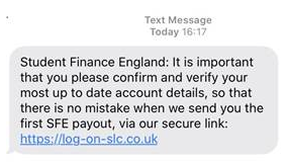Watch out for fraud #QMMoneyTips
Are you confident you can tell when someone is trying to scam you out of your money?
The Student Advice and Counselling team has put together their latest newsletter filled with hints and tips on how to spot and avoid being the victim of fraud.
Published:
Fraudsters like this time of year as they know Student Finance Maintenance Loans and Grants are paid to students and many international students are still new to the UK.
There are two main types of scams to watch out for:
- Phishing emails and texts which target students in order to obtain online account details and passwords, so fraudsters can access personal information and money.

- Phone calls pretending to be from Student Finance England, the Home Office or the police. These can be random but if you have an account or have had some recent contact with that organisation, the calls can seem genuine. The caller can be persistent and threaten you with fines, closing your account or deportation from the UK, if you don’t do what they say.
Here are some useful tips to consider:
- Think before you click a link: hover the cursor over the email or text to see the link and check it’s genuine – if in doubt contact the organisation directly.
- The Home Office will never call you and put pressure on you to pay them money, or ask for your bank and personal details, or threaten you with fines or deportation.
- Only criminals will pressurise you to provide personal information or transfer money. This can often be very persuasive to encourage you to follow their instructions and provide them with personal information, bank details or to transfer funds.
- Banks and financial institutions will never send you an email or text asking you to click a link to confirm your bank details, or to transfer money to another account.
- Phishing emails and texts are unlikely to state your full name, only ‘Dear Student’ and often contain misspelling, poor punctuation and grammar.
- Always contact the organisation directly to check if a request is genuine.
- Student Finance England (SFE) will never ask you to confirm your bank details, login information or personal financial information by email or text message.
- Report suspicious SFE emails or text to phishing@slc.co.uk or contact SF NI, SFW or SAAS if you are funded by them.
- Check out SFE’s Guide to identifying Phishing Scams and how to avoid them
- Report all scams to Action Fraud, the national centre for fraud and cybercrime and get advice from their website about your options.
- Check our Facebook and Twitter posts this November for advice about fraud: · Twitter: @QMUL_ACS Facebook: http://on.fb.me/pj5TP3
